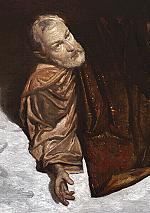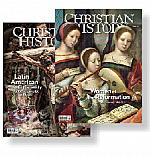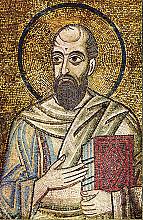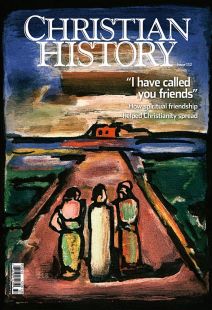Don’t call it a list
In 1987 preaching professor Fred Craddock preached a sermon about Paul’s list of friends in Romans 16. He imagined in modern-day terms how each of these people might have contributed to Paul’s ministry.

[Apostle Paul, c. 1633, Rembrandt, oil on canvas, Kunsthistorisches Museum [Public domain] / Wikimedia]
IN THE LIST there is a husband and wife, Aquila and Priscilla. There’s a man and his mother, Rufus and his mother. There is a brother and sister, Nereus and his sister. There are brothers, Andronicus and Junias. There are sisters, Tryphaena and Tryphosa. There is an old man, Epaenetus. Isn’t that an interesting profile of the church? There’s a single woman, Mary. There’s a single man, Herodion. Not a lot of nuclear family there at all except as Christ has called them together. . . .
Paul didn’t call it a list: Aquila and Priscilla, they risked their necks for me. Andronicus and Junias, we were in jail together. Shoot, they’re great Christians. There’s Mary. Mary worked hard. She was there when everybody else quit. She’s the one who always said, “Now, Paul, you go on home. I’ll put things up. I’ll put the hymnals away, and I’ll pick up all the papers and straighten the chairs. You go on home. You’re tired.” “Well, Mary, you’re tired too.” “Yes, Paul, but you’ve got to ride a donkey across Asia tomorrow. You go on. I’ll pick up here.” Mary worked hard.
Epaenetus, the first person converted under my preaching, and I didn’t sleep a wink that night saying, “Thank God, finally somebody heard.” The first one to respond to the gospel. What a marvelous day that was.
Tryphaena and Tryphosa, obviously twins. You hear it, don’t you? In the names? Tryphaena and Tryphosa. They always sat on this side, and they both wore blue every Sunday. I never knew them apart really. One of them had a mole on her cheek, but I didn’t know if it was Tryphaena or Tryphosa. I never did get
them straight.
And Rufus. Tell Rufus hello, and tell his mother hello because she’s my mother too. Some woman earned from this apostle the title “mother.” Can’t you see her, this woman able to be mother to Paul? He probably stayed in their home. She was a rather large woman, always wore an apron. A lot of things stuffed in the pocket of the apron. Hair pulled back in a bun. Fixed a good breakfast. Paul said, “I’m sorry. I can’t stay. I have to be on my way.” “Sit down and eat your breakfast. I don’t care if you are an apostle. You’ve got to eat.” Tell my mother hello.
This is not a list. . . .
Keep the list
Do you have a piece of paper? Do you have a piece. . . . Well, use your worship bulletin. Would you write in the margin somewhere or at the bottom these words: “I THANK MY GOD IN ALL MY REMEMBRANCE OF YOU.”
Write a name. You choose the name. You remember the name. And another name. . . . Keep the list. Keep the list because to you it’s not a list. In fact, the next time you move, keep that. Even if you have to leave your car, and your library, and your furniture, and your typewriter, and everything else, take that list with you. In fact, when your ministry has ended and you leave the earth, take it with you.
I know. I know. When you get to the gate, St. Peter’s going to say, “Now, look, you went into the world with nothing. You’re going to come out of it with nothing. Now, what do you have there?”
“Well, it’s just some names.” . . .
He’ll say, “I want to see it.” And you’ll give it to him, and he’ll smile and say, “I know all of them. In fact, on my way here to the gate I passed a group. They were painting a great big sign to hang over the street. And it said, ‘Welcome Home.’”
By Fred Craddock
[Christian History originally published this article in Christian History Issue #132 in 2019]
Excerpt from “When the Roll Is Called Down Here” by Fred Craddock, Bandy Distinguished Professor of Preaching and New Testament Emeritus in the Candler School of Theology at Emory University. Reprinted by permission of John B. Craddock.Next articles
Editor's note: Spiritual friendships
Friendship between Christians always has an added dimension
Jennifer Woodruff TaitSpiritual Friendship, Did you know?
Pomegranates, organ-playing, and centuries of circles of Christian friends
the editorsSupport us
Christian History Institute (CHI) is a non-profit Pennsylvania corporation founded in 1982. Your donations support the continuation of this ministry
Donate







